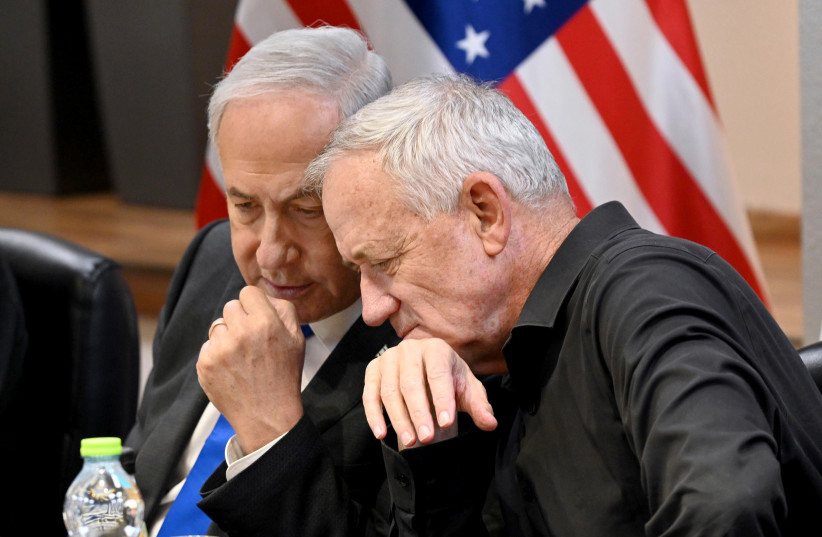On October 7, Israel experienced the biggest attack and loss of life in a single day in the country's history, launching it into war against Hamas. At a time of such trauma and panic, the nation looked to its leaders to take responsibility, and many in the government and the military did, but most notably, Prime Minister Benjamin Netanyahu has refused to do so.
The prime minister has insisted on multiple occasions in which he was asked to take responsibility for the attack that his responsibility was only for the future and to see Israel through the war while also saying that he has no intention of resigning.
Among those who have taken responsibility for the failures that led to the attack are Defense Minister Yoav Gallant, IDF Chief of Staff Herzi Halevi, Shin Bet chief Ronen Bar, National Security Council head Tzachi Hanegbi, Air Force Commander Tomer Bar, and head of Israel's intelligence Directorate Maj.-Gen. Aharon Haluye.
Ministers have taken responsibility
On the political side, a number of ministers have also taken responsibility, as have people who were in Israel's leadership in the last couple of years including former prime minister Naftali Bennett and former defense minister Benny Gantz.

With all these people, who answer to Netanyahu, taking responsibility, Israel has been looking to their prime minister to do the same.
But this dodging of responsibility on Netanyahu's part could be a political calculation as he proved on Sunday that he is still taking into account the future of his government in his decision making.
Nuking Gaza
When Otzma Yehudit Heritage Minister Amichai Eliyahu made a comment about nuking Gaza that could have potentially massively damaged Israel's international standing, Netanyahu didn't risk alienating the party by firing Eliyahu. Instead, he chose to suspend Eliyahu and violated that suspension later in the day when he allowed the minister to vote in a government survey.
Netanyahu will do everything he can to make sure his government and he survive this, and avoiding any admission of culpability so that it cannot be used against him later could be one way of achieving this. But even if he doesn't resign, the decision could be taken out of his hands as recent reports have indicated that a vote of no confidence is in the works for after the war. Therefore, to keep his government going, Netanyahu will have to maintain the government's and the people's confidence.
In the past, leading Israel through wars and operations improved Netanyahu's political standing, giving him an extra 14 seats in 2015 after Protective Edge the year previously, and helping him close a growing gap between the Likud and National Unity in polls earlier this year after smaller operations.
But this time, the situation is different. While Hamas started the war with its attack, the massivity and the element of surprise lead Israelis to feel that there was a great failure in leadership and intelligence and they want answers.
Leading Israel to victory isn't going to be enough this time. Israel will want to see leadership being held accountable, meaning that the very thing Netanyahu is avoiding is perhaps exactly what will help him.
Polls released in the weeks since the war began indicate that Israelis strongly believe that Netanyahu should take responsibility for October 7. In one, 80% of Israelis voiced this opinion (including a majority of his own constituents) while in another, 86% of respondents say they hold the government responsible for the attack whether or not Netanyahu admits to it.
A poll that came out four weeks after the beginning of the war showed that more than half of Israelis believe that Netanyahu should resign and that public faith in him has been sinking.
Meanwhile, the polls also give the Netanyahu-led Likud the lowest number of mandates (19) the party has won since 2006 when it only had 14. On the other hand, Gantz's National Unity party would get double the mandates that Likud would if elections were held today. Accordingly, only 27% of Israelis said that Netanyahu is more fit to be prime minister than Gantz.
Unlike Netanyahu, Gantz has taken responsibility for his failure to thwart the attack during his time as IDF chief of staff or defense minister, and yet, support for him has tripled. In the same vein, most IDF officials have taken responsibility for their failures, but Netanyahu's approval rating is lower than the IDF, its leadership, and Gallant.
Netanyahu will need to regain the trust of his people in order to survive politically, and in order to do that, he needs to listen to their needs and follow the examples of all the leaders surrounding him. Taking responsibility for his leadership failures is the first step in that direction.
